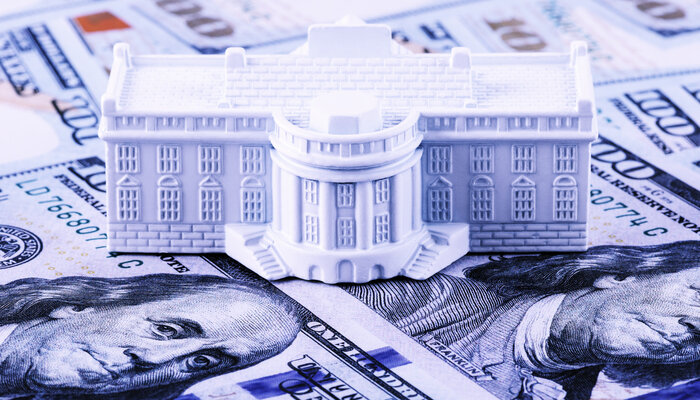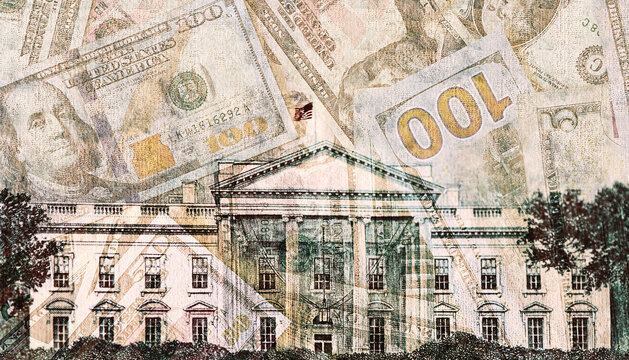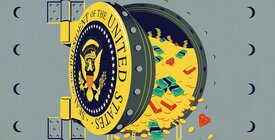Rising political corruption highlights the need for structural reforms to strengthen federal institutions and rein in conduct that harms American citizens. Harmful Supreme Court decisions, erosion of norms, and public officials’ increasing brazenness have created this moment. But the public and Congress can take immediate steps to curtail political corruption and, in the longer term, push for more fundamental reforms to return democratic power to the American people.

What Is Political Corruption and What Can We Do About It?
It hurts ordinary Americans in concrete ways, and the risk has never been greater given today’s unprecedented mixing of private wealth with political power.

Part of
Corruption in America
The Abuse of Public Office for Private Gain
The word “corruption” is regularly used to describe politicians’ conduct but seldom defined. In political discourse, the word is sometimes used broadly to refer to anything that seems dysfunctional or otherwise harmful to the public interest. At the same time, the Supreme Court has significantly narrowed the legal definition of corruption, curbing the reach of criminal anticorruption laws and limiting policymakers’ ability to regulate the role of money in politics.
Despite its frequent and varied use, the term “political corruption” has a widely accepted definition: the abuse of public office for private gain. Importantly, while “private gain” includes not just economic benefits like money and material goods but also other unfair advantages, this analysis focuses primarily on examples of financial self-enrichment.
Political Corruption Harms Ordinary People
When government officials make decisions motivated by money or other forms of undue private gain, it warps policy and hurts the public. Things like public education, healthcare, infrastructure, and public safety lose out as public funds get misdirected and the quality of government services decreases.
The United States has seen corruption and its results many times in its history. During the late-19th century’s Gilded Age, for example, politicians routinely took bribes from corporations in deals that ultimately allowed those with the most wealth — robber barons and industrial conglomerates — to avoid regulation and gobble up public resources on favorable terms. Meanwhile, workers often faced long hours, dangerous jobs, and meager wages with few legal protections. Overcrowded housing, poor sanitation, and contaminated food were common.
Corruption has also played a major role in various financial crises. The lack of regulation bought by Gilded Age tycoons facilitated fraud and speculation, which led to stock market and banking crashes that cost people their life savings.
A century later, deregulation driven by the banking industry and the politicians it supported produced the 1980s savings and loan crisis, a banking collapse that cost taxpayers over $130 billion. But even after that scandal, Congress and regulators succumbed to pressure from the banking industry’s lobbying and campaign contributions to repeal laws designed to ensure market stability, prevent regulation of risky new financial products, and weaken watchdog agencies. These efforts paved the way to the subprime mortgage crisis, which sparked the biggest economic collapse since the Great Depression.
Beyond tangible losses, corruption erodes trust in government. When people feel like the system is rigged against them, many disengage from public life and choose not to vote, making government less representative and even less responsive to their needs. Public confidence in government plummeted in the 1970s after the Watergate scandal exposed abuses of power in the Nixon White House, and it has never fully recovered. Many nonvoters today continue to say they stay home because they don’t trust the government.
Current Political Corruption
The conduct we’re seeing now reflects and amplifies the widespread erosion of norms that has infected all branches of the federal government. While corruption has ebbed and flowed since America’s founding, the worst abuses of the past — the rampant bribes that fueled the Gilded Age and the Teapot Dome scandal in the 1920s that sent the secretary of the interior to prison — consisted of individual personal enrichment.
Subsequent reforms greatly diminished this type of corruption by improving public administration, increasing governmental transparency, and imposing new ethics and anticorruption rules. Starting in the mid-20th century, however, more structural forms of corruption emerged, driven by the increasingly significant role of money in politics. Attempts to curtail this newer form of corruption have been much less successful, due in part to interference by the Supreme Court. Now, with conditions ripe for abuse, personal corruption is again on the rise.
Democratic and Republican administrations have both seen their share of corruption scandals in recent decades. President Bill Clinton was criticized for rewarding big campaign donors with overnight stays at the White House and for a string of controversial pardons at the end of his term. The George W. Bush administration faced allegations of cronyism involving Iraq War contracts with Haliburton, among other scandals. And President Joe Biden faced criticism over his son’s business activities trading on his father’s position when Biden was vice president, as well as for his decision to issue norm-busting preemptive pardons to family before leaving office.
President Trump, however, has intensified and normalized the extreme mix of money, power, and conflicts of interest with his uniquely transactional and personalist approach to governing, merging his political identity with his personal business interests. Trump shattered norms in his first term when he refused to divest from his hotels and other businesses, resulting in widespread conflicts of interest as foreign governments and lobbyists sought to curry favor with the administration through lavish spending at Trump’s properties. As the examples below show, his actions have been even more sweeping in his second term.
Using Money to Gain Access and Sway Policy Decisions
For most of modern U.S. politics, especially since the Supreme Court’s 2010 ruling in Citizens United v. Federal Election Commission, it has been common for political leaders in both parties to give wealthy donors access and influence in exchange for large campaign contributions. This practice can result in donor-friendly policies that persist despite being broadly unpopular, such as the carried interest loophole that saves Wall Street billions in taxes each year. In addition, past presidents have often rewarded donors with ceremonial or symbolic positions in the administration, especially ambassadorships in desirable locations.
President Trump has taken donor influence to new heights. He overtly pressured oil industry executives to give $1 billion to his reelection effort, promising to slash pollution regulations and roll back Biden administration clean energy initiatives. He also assembled the wealthiest administration in history, appointing an unprecedented number of billionaire donors to key roles in his cabinet and at agencies where they direct policymaking — potentially over matters implicating their own financial interests. Elon Musk alone spent nearly $300 million to help President Trump win the 2024 election and, for a period of time, became one of Trump’s closest advisers as the administration took a series of actions benefiting Musk’s companies.
Moreover, unlike other politicians who hold expensive private fundraisers, Trump is using his events to profit personally rather than raising money for a campaign. Since the 2024 election, Trump has sold access at $1 million-per-plate dinners at his Mar-a-Lago resort, one-on-one meetings with business leaders for $5 million, and a private dinner with the 220 individuals who spent the most buying Trump’s cryptocurrency — nearly $400 million in total. It is also notable how many donors have since received significant benefits, including pardons and favorably resolved enforcement actions brought by agencies like the Securities and Exchange Commission.
Insider Self-Enrichment
Trump is merging the powers of the presidency with his businesses and personal finances to an extent never before seen, including by boosting his family’s cryptocurrency business and striking international real estate deals. Trump is able to remain involved in his business empire after refusing to put his holdings into a blind trust — a precaution that every president since the 1970s except Trump has taken to maintain public trust and avoid even the appearance of corruption.
There are examples beyond the Trump Organization’s business dealings. Trump has accepted at least one lavish gift from a foreign government — a $400 million luxury jet from the Qatar that reportedly will be given to the president’s library after he leaves office.
Other officials in the administration stand to benefit as well, given their unusually long list of conflicts and the lack of meaningful deterrence due to weak enforcement and the gutting of existing anticorruption safeguards. For example, Trump’s special envoy to the Middle East, Steve Witkoff, is negotiating deals on behalf of the administration alongside his extensive business interests in the region. Others like Commerce Secretary Howard Lutnick, Health Secretary Robert F. Kennedy Jr., and Medicare and Medicaid administrator Mehmet Oz are handling matters that could impact their own or their family’s investments.
Self-enrichment isn’t unique to the executive branch, however. Members of Congress continue to profit from insider trading due to lax enforcement of existing rules, and they refuse to adopt popular reforms like a proposed law that would bar them from trading stocks altogether. Meanwhile, Supreme Court justices accept extravagant gifts, including from individuals with business before the Court. This happens with minimal transparency and no accountability, as the justices are not subject to a binding code of ethics
Coercion and Shakedowns
Trump has also aggressively used personal lawsuits to extract payments from companies that draw his ire, something no other president in modern American history has done. ABC, Meta, and Paramount, for example, each agreed to pay tens of millions of dollars to Trump’s presidential library fund to settle Trump’s claims against them.
Although experts dismissed these claims as meritless, company executives apparently decided that cutting deals to stay in Trump’s good graces was preferrable to fighting in court. In Paramount’s case, this decision came as it has sought approval from the Federal Communications Commission for a potentially lucrative merger with Skydance Media.
The Causes that Created this Moment
Several key factors have paved the way to this moment, including harmful Supreme Court decisions, cynical public discourse, and the Trump administration’s hostility to checks and balances.
Supreme Court Decisions Allowing Corruption to Thrive
For decades, the Supreme Court has whittled down campaign finance regulations and narrowed the legal definition of how the influence of money in politics can count as corruption. These decisions, starting with Buckley v. Valeo in 1976 and continuing through Citizens United and others, sparked an explosion of political spending. This flood of money comes in particular from super PACs, which can raise and spend unlimited amounts. It has allowed ultra-wealthy donors to dominate politics in ways that were illegal before Citizens United and would be unacceptable in other countries.
In another series of cases, the Court pared back federal criminal anticorruption statutes, tacitly accepting it as an unavoidable part of politics. The Court also stripped away checks on presidential power, including rules for firing executive branch officials and prosecutors’ ability to hold the president accountable for misconduct while in office.
By carving out vast swaths of conduct from accountability, narrowing the scope of what counts as corrupt, and severely limiting the tools available to rein it in, these decisions create an environment that emboldens bad behavior from public officials.
A Cynical View of Corruption
For years, partisans have exploited the legal landscape the Supreme Court created, pushing the boundaries of what conduct is deemed acceptable and diluting public discourse around corruption. The rise of scorched-earth politics in the late 1980s saw accusations of corruption become partisan cudgels. The practice of labeling anything the other side does as corrupt has contributed to public cynicism about the political system and robbed the term of its meaning. So has the media’s horse-race coverage of elections and its frequent habit of false balance.
While he doesn’t have a monopoly on norm-busting behavior, President Trump has accelerated these trends with his openly transactional approach to power. He campaigned on the promise to reward friends and punish enemies and now flaunts his favor or disfavor and the resulting consequences. This brazenness warps perceptions about what conduct counts as corrupt, reinforcing the public’s belief that corruption is a normal part of American politics and setting a precedent for future misconduct.
Elimination of Guardrails Against Corruption
The Trump administration has asserted a radical and unrestrained view of executive power, pointedly dismantling watchdog entities and longstanding anticorruption enforcement mechanisms. For example, the administration has:
- Fired the head of the Office of Government Ethics
- Fired or demoted at least 20 agency inspectors general
- Drastically reduced the staffing of the Department of Justice’s Public Integrity Section, which prosecutes public officials accused of corruption
- Disbanded the FBI squad that investigates congressional misconduct and fraud within federal agencies
- Scaled back enforcement of the Corporate Transparency Act, which requires companies to report “beneficial owners” to the government — reducing transparency and protecting donors who use domestic shell companies to conceal their identities or make illegal political contributions
- Disbanded the DOJ’s Foreign Influence Task Force
- Restricted criminal enforcement of the Foreign Agents Registration Act and the Foreign Corrupt Practices Act
- Dramatically expanded the use of pardons to benefit political allies and undermine corruption convictions.
How to Limit Corruption
American history has shown that public backlash can provoke meaningful reform. Most recently, outrage related to the banking industry bailout following the 2008 financial crisis led to new guardrails to protect economic stability. After the Watergate scandal that brought down President Richard Nixon, the subsequent flood of calls and letters from constituents spurred Congress to pass historic campaign finance and ethics reforms designed to increase transparency and curb the influence of big money in politics. And during the Gilded Age, public anger fueled mass demonstrations and political organizing, which led to a wave of Progressive Era reforms that improved living conditions, broke up monopolies, and reined in the influence of corporations over elections.
By refusing to accept corruption as an unavoidable part of politics and demanding accountability — through reporting, whistleblowing, and political pressure — citizens can bring about real change.
The rising threat of concentrated wealth and power dominating our political system demands a strong response and commonsense reforms. In the short term, Congress should restore the checks and balances and anticorruption guardrails that the current administration has dismantled and expand federal ethics reforms to close loopholes that exempt the president and other top officials from even the most basic conflict of interest safeguards. It should also overhaul campaign finance rules to counter the worst effects of the Supreme Court’s misguided decisions and give candidates a path to fund campaigns without relying on ultra-wealthy donors.
The system also needs changes at a more fundamental level. The normalization of political corruption in American politics has eroded the foundations of democratic governance. In response, the country needs a bold reform agenda to return power to the American people and restore trust and integrity in government. This means revitalizing Congress’s capacity as the first branch of American government, reining in an out-of-control executive branch, and reforming a judiciary that has become increasingly out of touch with the people.
To realize this vision, the public must hold elected leaders accountable and push for these reforms to become a governing priority moving forward.
More from the Corruption in America collection
-
Codifying the Constitution’s Emoluments Clauses
To prevent corruption, the Constitution prohibits the president and other officials from receiving untoward benefits. Congress, however, must take action to enable enforcement. -
Political Donors Should Not Be Above the Law
The line between public service and private gain continues to blur as financial elites secure pardons and regulatory leniency following campaign contributions. -
Fossil Fuel Industry Donors See Major Returns in Trump’s Policies
The Trump administration’s embrace of the oil and gas industry’s agenda provides another example of how wealthy special interests shape policies.




